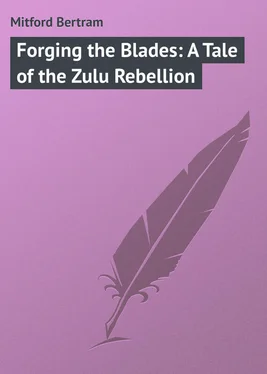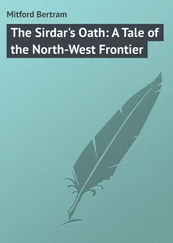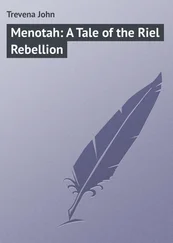Bertram Mitford - Forging the Blades - A Tale of the Zulu Rebellion
Здесь есть возможность читать онлайн «Bertram Mitford - Forging the Blades - A Tale of the Zulu Rebellion» — ознакомительный отрывок электронной книги совершенно бесплатно, а после прочтения отрывка купить полную версию. В некоторых случаях можно слушать аудио, скачать через торрент в формате fb2 и присутствует краткое содержание. Жанр: foreign_prose, на английском языке. Описание произведения, (предисловие) а так же отзывы посетителей доступны на портале библиотеки ЛибКат.
- Название:Forging the Blades: A Tale of the Zulu Rebellion
- Автор:
- Жанр:
- Год:неизвестен
- ISBN:нет данных
- Рейтинг книги:4 / 5. Голосов: 1
-
Избранное:Добавить в избранное
- Отзывы:
-
Ваша оценка:
- 80
- 1
- 2
- 3
- 4
- 5
Forging the Blades: A Tale of the Zulu Rebellion: краткое содержание, описание и аннотация
Предлагаем к чтению аннотацию, описание, краткое содержание или предисловие (зависит от того, что написал сам автор книги «Forging the Blades: A Tale of the Zulu Rebellion»). Если вы не нашли необходимую информацию о книге — напишите в комментариях, мы постараемся отыскать её.
Forging the Blades: A Tale of the Zulu Rebellion — читать онлайн ознакомительный отрывок
Ниже представлен текст книги, разбитый по страницам. Система сохранения места последней прочитанной страницы, позволяет с удобством читать онлайн бесплатно книгу «Forging the Blades: A Tale of the Zulu Rebellion», без необходимости каждый раз заново искать на чём Вы остановились. Поставьте закладку, и сможете в любой момент перейти на страницу, на которой закончили чтение.
Интервал:
Закладка:
“Keep it there till it’s done. They won’t know it from beef. Howling joke, eh?”
“Rather,” she laughed. “They’ll all unconsciously aid and abet us in breaking the laws of Cetywayo’s country.”
The police horses were toiling up the slope, then standing with heaving flanks in front of the store. Their riders were not sorry to dismount.
“Well, Mr Halse, how goes it?” cried Meyrick, shaking hands. “Miss Halse – why, you are looking better than ever since those two dances we had together at Ezulwini.”
“Oh, thanks,” laughed Verna. “But that’s a poor compliment. You ought not to have allowed the possibility that I could look better than ever.”
“Sharp as ever, anyhow,” retorted Meyrick. And his comrade broke into a guffaw.
“This is Francis,” he introduced, “commonly known in the force as Frank. It’s shorter, you see, and means the same thing. Now we all know each other.”
“Not got your step yet, sergeant?” said Ben Halse. “Thought you’d have been Sub-Inspector next time I met you.”
“Don’t chaff, Mr Halse. It’s a sore point with me. The powers that be are so dashed ungrateful.”
“Well, anyway, come inside and have a refresher after your ride. I’ll send my boy to off-saddle for you. Scoff will be ready directly.”
“We kept it back on purpose when we saw you toiling up there beyond Lumisana,” said Verna. “If the sirloin is overdone it’s due to that.”
“Sirloin! By Jove! that’s royal!” cried Meyrick. Whereat Verna laughed mischievously.
Assuredly Ben Halse’s ménage kept up its reputation for hospitality, thought these two guardians of law and order, as they sat there doing full justice to the result of the midnight poaching expedition.
“Why, this beef is A1,” pronounced Meyrick, beginning upon a second helping. “You couldn’t get anything like it even in Old England.”
“I’m sure you couldn’t,” assented their host, with a touch of dryness, while Verna’s eyes danced. “The bottle’s at your right elbow – help yourself. What’s the latest from down country, by the way?”
“All sorts of yarns. They are brewing up for a row in Natal. There’s a sweep called Babatyana inclined to make trouble. Now, Mr Halse, you ought to be an authority. If there’s a bust-up there do you think it’ll spread up here?”
“Sure to. But, to what extent is another thing.”
“How does feeling run in these parts? Sapazani, you know, doesn’t carry a particularly good reputation.”
“Depends on how it’s handled. By the way, if I were you I wouldn’t name names,” for the boy had just come into the room to change the plates, and the swift look of interest that had flashed across his face as he caught the name of his chief was not lost on the experienced up-country man. “This boy here belongs to his tribe, and he’ll connect his chief’s name with the police uniform. See?”
Meyrick felt small, and said so.
“Did he hear? What an idiot I am. Well, Mr Halse, you were chaffing me about the Sub-Inspectorship, but it’s obvious I’m not ripe for it yet.”
Ben Halse passed it off with a tactful and consolatory remark, and they talked about other things. Not until afterwards did it occur to Meyrick that his host had given him no information whatever on the subject of the loyalty of Sapazani.
“He’s got some cheek, that same party whom we won’t name,” said Francis. “He flatly refused to salute his magistrate with the ‘ Bayéte ’ when he went to see him – hailed him as ‘ Inkose ’ instead; said the ‘ Bayéte ’ was the salute for kings.”
“He’s about right,” said Ben Halse. “There’s a precious deal too much of that ‘ Bayéte ’ joke going along. Every waggon-builder’s apprentice seems to expect it. What did Downes say? I’d like to have been there.”
“He nearly died of rage. Then he asked Sapazani, rather sneeringly, which king he would give the ‘ Bayéte ’ to, and the answer was, ‘Any king ,’ which was rather smart. Downes talked of arresting him for treating his court with insolence, but there were only three of our chaps in the place, and Sapazani had a following with him big enough to have captured the whole show, even with kerries, so he chucked that plan.”
“Well, he was wise there,” said Ben Halse. “There’s no law in existence here or anywhere else I know of, that compels a native to address his magistrate as ‘Your Majesty,’ which is what giving him the salute royal amounts to. And this particular chief – to name no names – is quite knowing enough to get hold of a lawyer to stick up for him. There’s more than one that would be glad to, and could do it too.”
The fact was that the speaker knew all about this incident as well as did the narrator – and a good deal more connected with it which the latter didn’t, but this he kept to himself.
“Sapazani is a great friend of ours,” said Verna; “but I should think he’d be quite capable of making himself disagreeable if he was rubbed the wrong way.”
Then they talked on, about other things and people, and the afternoon wore on. Suddenly Meyrick was seen to start as if he had been shot, and to grope wildly and hurriedly in his pockets.
“I’m most awfully sorry, Mr Halse, for being such a forgetful ass,” he said; “but I forgot to give you this” – producing a letter. “Two of our chaps came back from Ezulwini and brought it out.”
“That’s all right. I dare say it isn’t a matter of life and death,” was the characteristic answer. But the speaker’s face was not wholly guiltless of a look of astonishment as he saw the envelope; and this was evoked not so much by the sight, of the handwriting as by the fact that the missive had never been through the post. While his guests were saddling up he quickly mastered the contents, and his astonishment did not decrease.
“How should you like a run down to Ezulwini, Verna?” he said, after the police had gone.
“To Ezulwini?”
“Yes; perhaps to Durban.”
“I’d like it a lot. Makes a change. I’m quite jolly here, but still, a change bucks one up a bit.”
Her father smiled to himself. That letter had given him an idea which tickled him, for he had a very comical side.
“But what’s on?” she said. “Are we clearing out? Has it become time to?”
“No, no. There’s no row on – as yet. That’ll come, sooner or later, all in good time. Only business.”
“Oh! What kind?”
Verna was so completely in her father’s confidence in every department of the same that there was no inquisitiveness underlying the query. There was a joke in the background of this, however, which he was not going to let her into. It would keep.
“What kind?” he repeated. “Oh, general. I say, though, Meyrick and Francis are nice chaps, aren’t they? but, good Lord! their faces would have been a study if they could have seen through that heap of waggon sail in the yard that was staring them in the eye through the window all the time they were scoffing the other bit of the owner of that head, which was browsing away in Lumisana this time yesterday. Eh? Beef! Roast beef of Old England! That was killingly funny. What?”
“Yes, it was,” rejoined Verna, who was gazing after the receding figures of the police, growing smaller and smaller on the plain below. “Still, the mistake was excusable. There’s not much difference between either. When are we going to Ezulwini, dear?”
“H’m. In a day or two.”
Chapter Seven.
The Chief
Sapazani’s principal kraal was situated in a bushy hollow, shut in on three sides by a crescent of cliff and rock abounding in clefts and caves. It contained something like a hundred dome-shaped huts standing between their symmetrical ring fences, and the space immediately surrounding it was open, save for a small clump of the flat-topped thorn-tree, Sapazani, as we have shown, was ultra-conservative, and the slovenly and slipshod up-to-date formation of a kraal – or rather lack of formation, with huts dumped down anyhow – did not obtain among his clan. They kept to the old-fashioned double-ringed fence.
Читать дальшеИнтервал:
Закладка:
Похожие книги на «Forging the Blades: A Tale of the Zulu Rebellion»
Представляем Вашему вниманию похожие книги на «Forging the Blades: A Tale of the Zulu Rebellion» списком для выбора. Мы отобрали схожую по названию и смыслу литературу в надежде предоставить читателям больше вариантов отыскать новые, интересные, ещё непрочитанные произведения.
Обсуждение, отзывы о книге «Forging the Blades: A Tale of the Zulu Rebellion» и просто собственные мнения читателей. Оставьте ваши комментарии, напишите, что Вы думаете о произведении, его смысле или главных героях. Укажите что конкретно понравилось, а что нет, и почему Вы так считаете.












